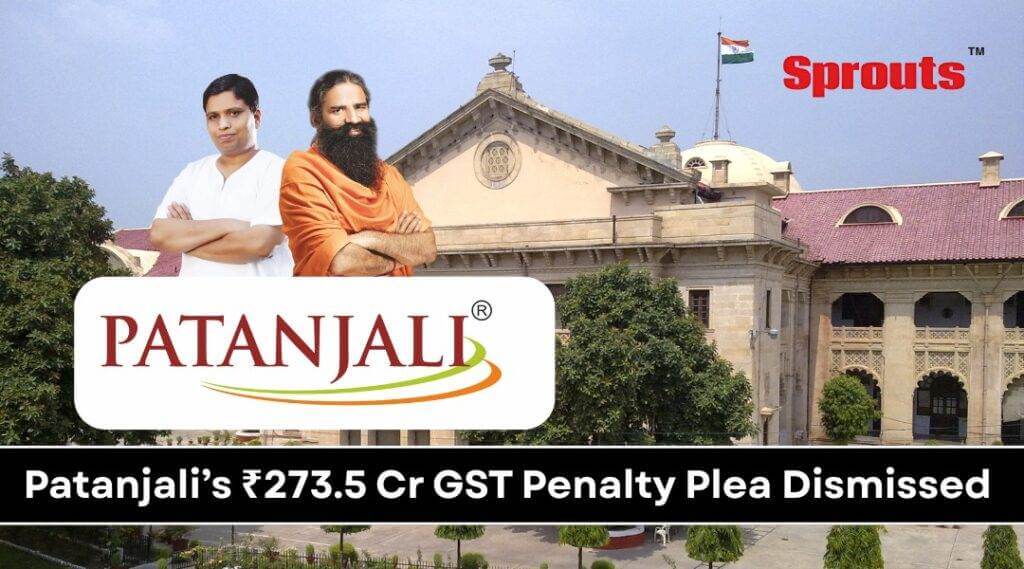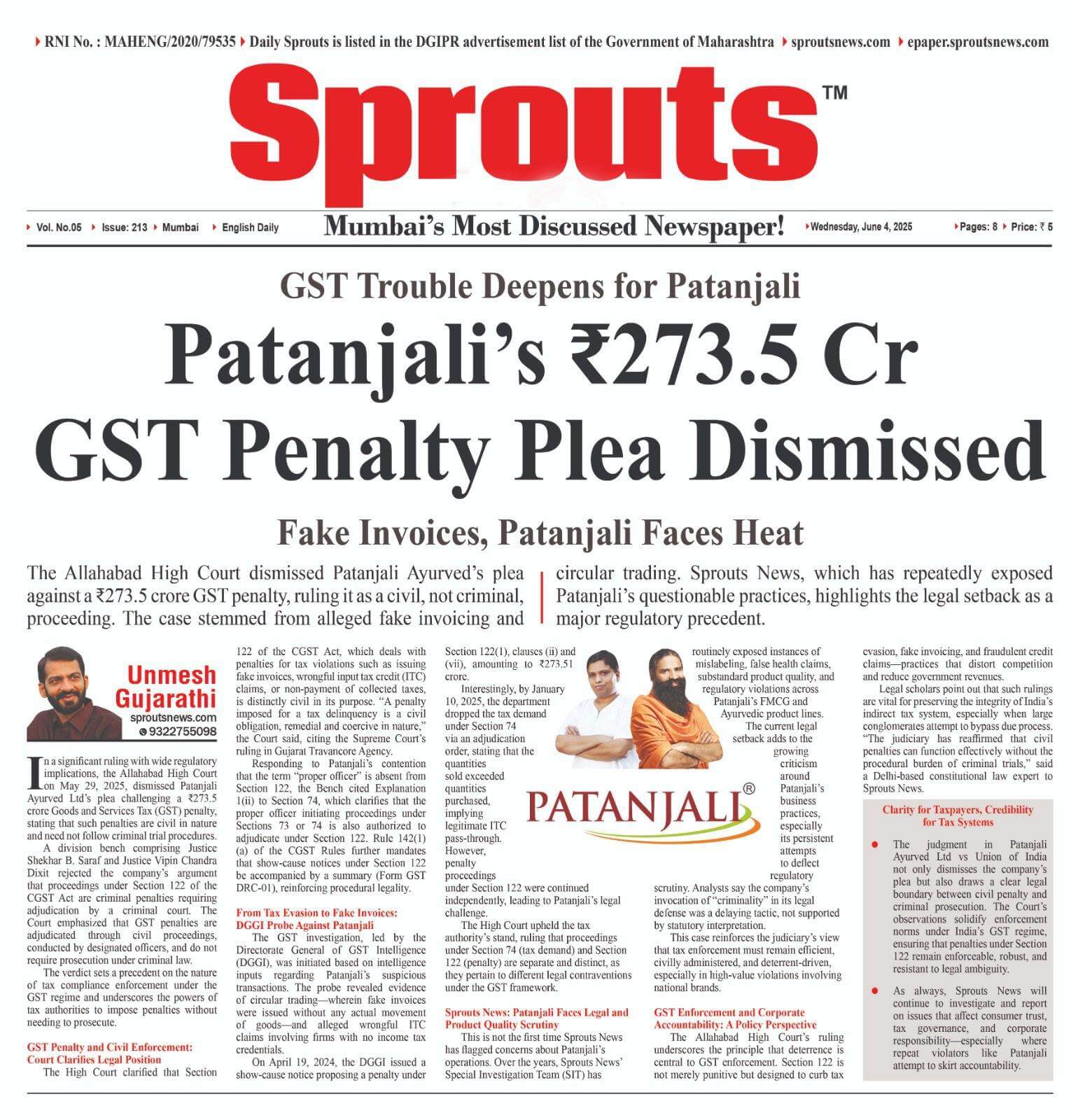Patanjali’s ₹273.5 Cr GST Penalty Plea Dismissed
• GST Trouble Deepens for Patanjali
• Fake Invoices, Patanjali Faces Heat
Unmesh Gujarathi
Sprouts News Exclusive
Contact: +91 9322755098
Contact: +91 9322755098
The Allahabad High Court dismissed Patanjali Ayurved’s plea against a ₹273.5 crore GST penalty, ruling it as a civil, not criminal, proceeding. The case stemmed from alleged fake invoicing and circular trading. Sprouts News, which has repeatedly exposed Patanjali’s questionable practices, highlights the legal setback as a major regulatory precedent.
In a significant ruling with wide regulatory implications, the Allahabad High Court on May 29, 2025, dismissed Patanjali Ayurved Ltd’s plea challenging a ₹273.5 crore Goods and Services Tax (GST) penalty, stating that such penalties are civil in nature and need not follow criminal trial procedures.
A division bench comprising Justice Shekhar B. Saraf and Justice Vipin Chandra Dixit rejected the company’s argument that proceedings under Section 122 of the CGST Act are criminal penalties requiring adjudication by a criminal court. The Court emphasized that GST penalties are adjudicated through civil proceedings, conducted by designated officers, and do not require prosecution under criminal law.
Contents
- Patanjali’s ₹273.5 Cr GST Penalty Plea Dismissed
- • GST Trouble Deepens for Patanjali
- • Fake Invoices, Patanjali Faces Heat
- GST Penalty and Civil Enforcement: Court Clarifies Legal Position
- From Tax Evasion to Fake Invoices: DGGI Probe Against Patanjali
- Sprouts News: Patanjali Faces Legal and Product Quality Scrutiny
- Also Read: FRA in Crisis: Fake Fees, Student Betrayal & Massive Loot Exposed.
- Related Article: Ramdev Baba in Trouble as Court Slams “Rooh Afza” Jibe, Condemns “Sharbat Jihad” Remark in Patanjali Ad Row.
- Related Article: Patanjali Losing Public Trust? Legal Trouble & Trust Issues.
- GST Enforcement and Corporate Accountability: A Policy Perspective
- Clarity for Taxpayers, Credibility for Tax Systems
The verdict sets a precedent on the nature of tax compliance enforcement under the GST regime and underscores the powers of tax authorities to impose penalties without needing to prosecute.
GST Penalty and Civil Enforcement: Court Clarifies Legal Position
The High Court clarified that Section 122 of the CGST Act, which deals with penalties for tax violations such as issuing fake invoices, wrongful input tax credit (ITC) claims, or non-payment of collected taxes, is distinctly civil in its purpose. “A penalty imposed for a tax delinquency is a civil obligation, remedial and coercive in nature,” the Court said, citing the Supreme Court’s ruling in Gujarat Travancore Agency.
Responding to Patanjali’s contention that the term “proper officer” is absent from Section 122, the Bench cited Explanation 1(ii) to Section 74, which clarifies that the proper officer initiating proceedings under Sections 73 or 74 is also authorized to adjudicate under Section 122. Rule 142(1)(a) of the CGST Rules further mandates that show-cause notices under Section 122 be accompanied by a summary (Form GST DRC-01), reinforcing procedural legality.

From Tax Evasion to Fake Invoices: DGGI Probe Against Patanjali
The GST investigation, led by the Directorate General of GST Intelligence (DGGI), was initiated based on intelligence inputs regarding Patanjali’s suspicious transactions. The probe revealed evidence of circular trading—wherein fake invoices were issued without any actual movement of goods—and alleged wrongful ITC claims involving firms with no income tax credentials.
On April 19, 2024, the DGGI issued a show-cause notice proposing a penalty under Section 122(1), clauses (ii) and (vii), amounting to ₹273.51 crore.
Interestingly, by January 10, 2025, the department dropped the tax demand under Section 74 via an adjudication order, stating that the quantities sold exceeded quantities purchased, implying legitimate ITC pass-through. However, penalty proceedings under Section 122 were continued independently, leading to Patanjali’s legal challenge.
The High Court upheld the tax authority’s stand, ruling that proceedings under Section 74 (tax demand) and Section 122 (penalty) are separate and distinct, as they pertain to different legal contraventions under the GST framework.
Sprouts News: Patanjali Faces Legal and Product Quality Scrutiny
This is not the first time Sprouts News has flagged concerns about Patanjali’s operations. Over the years, Sprouts News’ Special Investigation Team (SIT) has routinely exposed instances of mislabeling, false health claims, substandard product quality, and regulatory violations across Patanjali’s FMCG and Ayurvedic product lines.
The current legal setback adds to the growing criticism around Patanjali’s business practices, especially its persistent attempts to deflect regulatory scrutiny. Analysts say the company’s invocation of “criminality” in its legal defense was a delaying tactic, not supported by statutory interpretation.
This case reinforces the judiciary’s view that tax enforcement must remain efficient, civilly administered, and deterrent-driven, especially in high-value violations involving national brands.

Also Read: FRA in Crisis: Fake Fees, Student Betrayal & Massive Loot Exposed.
Related Article: Ramdev Baba in Trouble as Court Slams “Rooh Afza” Jibe, Condemns “Sharbat Jihad” Remark in Patanjali Ad Row.
Related Article: Patanjali Losing Public Trust? Legal Trouble & Trust Issues.
GST Enforcement and Corporate Accountability: A Policy Perspective
The Allahabad High Court’s ruling underscores the principle that deterrence is central to GST enforcement. Section 122 is not merely punitive but designed to curb tax evasion, fake invoicing, and fraudulent credit claims—practices that distort competition and reduce government revenues.
Legal scholars point out that such rulings are vital for preserving the integrity of India’s indirect tax system, especially when large conglomerates attempt to bypass due process. “The judiciary has reaffirmed that civil penalties can function effectively without the procedural burden of criminal trials,” said a Delhi-based constitutional law expert to Sprouts News.
Clarity for Taxpayers, Credibility for Tax Systems
The judgment in Patanjali Ayurved Ltd vs Union of India not only dismisses the company’s plea but also draws a clear legal boundary between civil penalty and criminal prosecution. The Court’s observations solidify enforcement norms under India’s GST regime, ensuring that penalties under Section 122 remain enforceable, robust, and resistant to legal ambiguity.
As always, Sprouts News will continue to investigate and report on issues that affect consumer trust, tax governance, and corporate responsibility—especially where repeat violators like Patanjali attempt to skirt accountability.

















